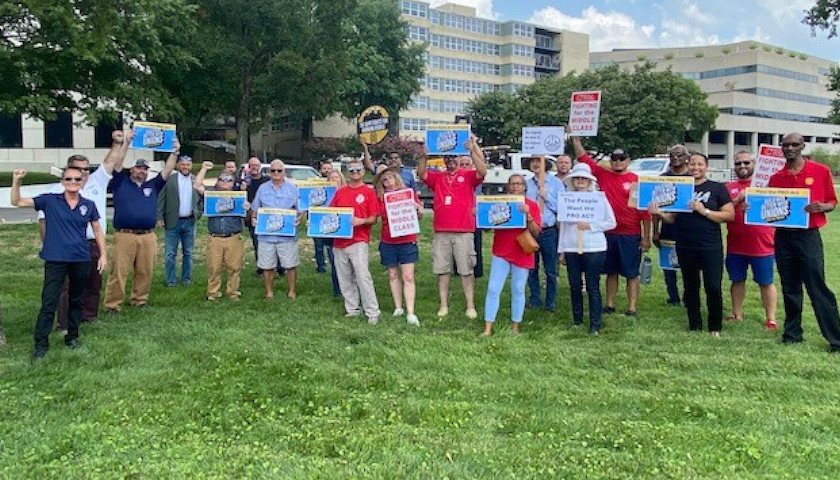Tennessee’s AFL-CIO chapter rallied Tuesday afternoon outside the Nashville offices of Republican Senators Marsha Blackburn and Bill Hagerty in favor of the Protecting the Right to Organize (PRO) Act.
The legislation would forbid states from maintaining right-to-work policies which allow workers who chose not to join a union to decline to pay union dues. The bill would also redefine many independent contractors as employees for purposes of collective bargaining — thus placing what many consider a heavy burden on freelancers — and would impose numerous other pro-union provisions.
Demonstrators stood in front of Hagerty and Blackburn’s offices chanting, “Hey Marsha, come on down! Nashville is a union town!” They carried signs saying, “Pass the PRO Act; Build Back Better with Unions,” a modification of President Joe Biden’s “Build Back Better” infrastructure slogan.
Both of Tennessee’s senators have voiced strong opposition to the PRO Act. “…The House’s Protecting the Right to Organize (PRO) Act threatens the livelihoods of those who earn money outside the bounds of a typical 9 to 5 job,” Blackburn wrote in a web commentary in February. “Whether a primary or supplemental income source, opportunities in the gig economy provide flexible employment options that increase earning power.”
Hagerty has been just as categorical.
“I strongly oppose the Democrats’ efforts to push their socialist agenda on Tennessee’s small businesses and manufacturers,” he tweeted in March. “Eliminating the right to work is bad for small businesses. I support hard-working Tennesseans, not unions.”
Almost all Democrats in the U.S. Senate have signed onto the PRO Act, but it has no Republican Senate sponsors and so far lacks the support of key center-left Senators Kyrsten Sinema (D-AZ), Mark Kelly (D-AZ), and Mark Warner (D-VA).
Like Blackburn and Hagerty, all of those senators hail from right-to-work states. Currently, 27 such states forbid “agency shop,” a feature of employment contracts that forces workers to pay dues to a union, whether or not they choose to join it.
As unions and left-wing lawmakers push for the PRO Act, collective bargaining has failed to see anything approaching a groundswell among American workers. In April, Amazon warehouse employees in Bessemer, Alabama decisively rejected representation by the Retail, Wholesale and Department Store Union in April. And last November, California voters handily approved Proposition 22, a ballot measure letting ride-hail and delivery drivers remain contractors rather than become employees subject to collective bargaining.
Patrick Semmens, a spokesman for the National Right to Work Committee, says PRO Act advocates are attempting to change a policy that Tennesseeans largely want to keep. He particularly doesn’t see that opinion changing within the Volunteer State’s current Senate delegation.
“Tennessee’s right to work law is very popular, and of course the key feature of the PRO Act would be eliminating all 27 right-to-work laws in the country and that’s on top of all the other union-boss power grabs that are in the so-called PRO Act,” Semmens said. “So, if [the senators] are worried about their voters, as opposed to a few radical union activists, you’d think that they’d be very firmly opposed to it.”
Other provisions of the legislation that Semmens sees as problematic include imposing “card check” to bypass secret-ballot unionization elections, a move many believe will lead to intimidation of workers by labor organizers. Semmens also objects to language in the bill impeding workers from decertifying their union and permitting the National Labor Relations Board to ignore a workforce’s initial rejection of unionization.
“Every aspect of the PRO Act is about giving union officials the power to force more workers into union ranks so that more workers can be forced to pay dues or be fired,” he said. “Once you understand and see that clearly, all the other provisions are just various ways to rig the game in favor of forcing more workers to pay dues to unions.”
– – –
Bradley Vasoli is a reporter at The Virginia Star and The Star News Network. Follow Brad on Twitter at @BVasoli. Email tips to [email protected].
Photo “Rally” by Tennessee AFL-CIO.








